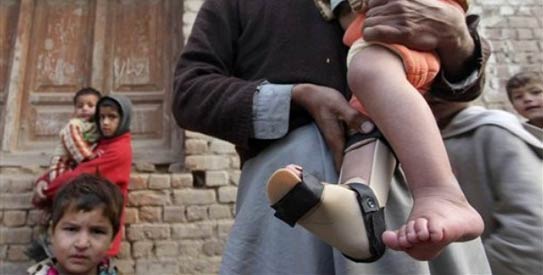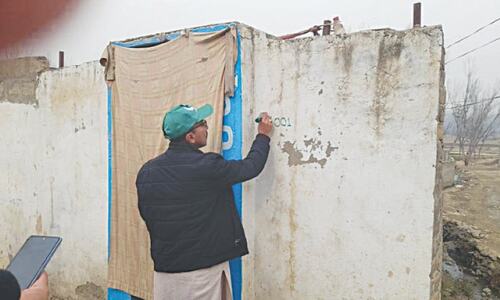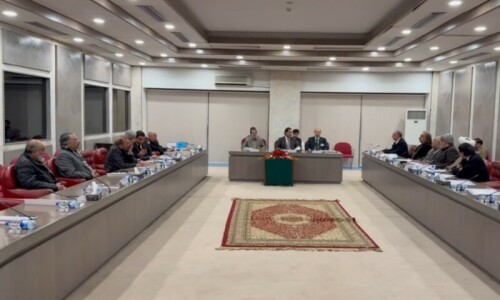
WE seem to live by controversies, thrive on them. Why should one feel enraged by the latest one then? Well, with very good reason. In the early sixties, when polio forced me to learn to walk a second time before reaching the age of three, I hadn’t been immunised, was then misdiagnosed and treated wrongly. Knowledge in our part of the world then was scanty at best.
Although heart-broken that their youngest would forever be marked by polio, it didn’t spell a disaster for my parents or even me for that matter. They had the means and the generosity to spare no effort to get me the best orthosis, an excellent education and then provided immense loving care, enabling me to grow up to be a ‘normal’, dare I say, confident man, a successful professional.
Despite this, to say life has been a cakewalk at least in the physical sense would amount to being economical with the truth. I didn’t really mind the occasional odd smart alec in the street drawing attention to my pronounced limp with a shout of ‘langray’. But it’s been so inconvenient to spend a lifetime catching up with the most considerate of friends when out for a walk. As I get older every tiny move is an effort, where ‘just a five-minute walk away’ was an alien concept anyway.
The idea here isn’t to make you reach out for a box of tissues. Not at all. It is just to say I know what I am talking about. For millions in our society, physical fitness and prowess is vital to earning a livelihood and a disability equals devastation, a life of complete want, dependency on others who often may not have enough to feed themselves.
So, what’s my point? Polio is on the verge of being eradicated around the world and nuclear-armed Pakistan had 198 cases in 2011, the highest anywhere. We all know the impact of disruption of the immunisation programme in the strife-torn parts of the country, particularly in the Tribal Areas. And also how the displaced may have taken the virus elsewhere.
We know that ignorant clergymen in certain parts of the country have given odious sermons against polio drops on completely false grounds such as these are actually being used for sterilisation, to impair an entire generation’s reproductive capability.
You’d agree this nonsense was in itself alarming, adding to the challenge of effectively carrying out the immunisation campaign which has to be ongoing and across the length and breadth of a country riddled with biases.
Then a couple of weeks ago, the politician, Shaikh Rasheed Ahmad, claimed on a TV programme that Unicef-supplied cheap, Indian-made ‘do number’ (spurious) drops were being given to children. Responding to my column on the issue, Prof Tariq Iqbal Bhutta, Chairman of the National Immunisation Technical Committee Group emailed me to say, among other things:
“There is a group of influential people who have been trying that EPI (extended programme of immunisation) should not buy the vaccines through the Unicef. They succeeded in 2008 when they went to the court and got a verdict in their favour. The court decided that the vaccines should be bought through local bidding. Unicef was not interested in bidding and the result was that Unicef was out of supplying the vaccine to the EPI. This resulted in higher prices for the vaccines, they were not supplied in the required amounts and on time… “… Is it that Sheikh Rashid is part of that interested party? I do not know. But the way he wildly talked about polio vaccine and Unicef I have my strong suspicion. You need to investigate that link.”
I have no means to investigate and wouldn’t cast aspersions on anyone without proof. But I did appeal to Shaikh Sahab not to speak on the issue if he didn’t really understand it. I so wish that was all.
Then on Tuesday night I saw a TV programme where some damaging allegations were made about how unsafe expired or heat-exposed polio drops can be. The participants were a couple of angry young doctors agitating the suspension of their senior colleagues, following the recent deaths at the Punjab Institute of Cardiology.
A disgruntled vaccinator also took part who said he was risking his job to tell the programme that out of date (expired) polio drops were being used in the campaign. First the vaccinator and then one of the young doctors, a paediatrician by his own account, said expired or heat-affected polio drops can potentially cause polio itself, even death.
This was a serious charge. The programme host couldn’t explore if there was another view like that of those running the EPI in order to give the audience a fuller, wider and perhaps a shade more balanced, perspective. It could have been an honest mistake. So, we tried to find out.
Prof Anita Zaidi, professor and chair, Paediatrics and Child Health at the Aga Khan University, is quite categorical: “It may lose its efficacy (depends on degree of colour change and heat exposure) but (does) not cause any harm.”
The colour change referred to here is on a dot on the label of the vaccine vial (vaccine vial monitor-VVM)) which changes when the drops become out of date or kept unrefrigerated (suffer heat exposure). Prof Bhutta, himself a paediatrician of repute, lamented the polio eradication programme had been thus ‘trashed’.
He said the assertions “are totally unfounded. If the VVM changes colour it simply means that the OPV (oral polio vaccine) is no more effective and will not protect the child if administered but does not cause any adverse reaction, let alone death … Pakistan is already the last country in the world with the highest number of polio and the situation will become worse if such propaganda continued.”
Another credible source tells me that recently a World Health Organisation (WHO) team visited Pakistan and certified that the vaccine stocks were good, while emphasising the need for the campaign to be run with renewed vigour.
Can we now devote ourselves to following this excellent advice and stop vying for ratings, playing politics with polio, please, that is if we were doing so? I know how devastating the consequences of any distractions can be.












































